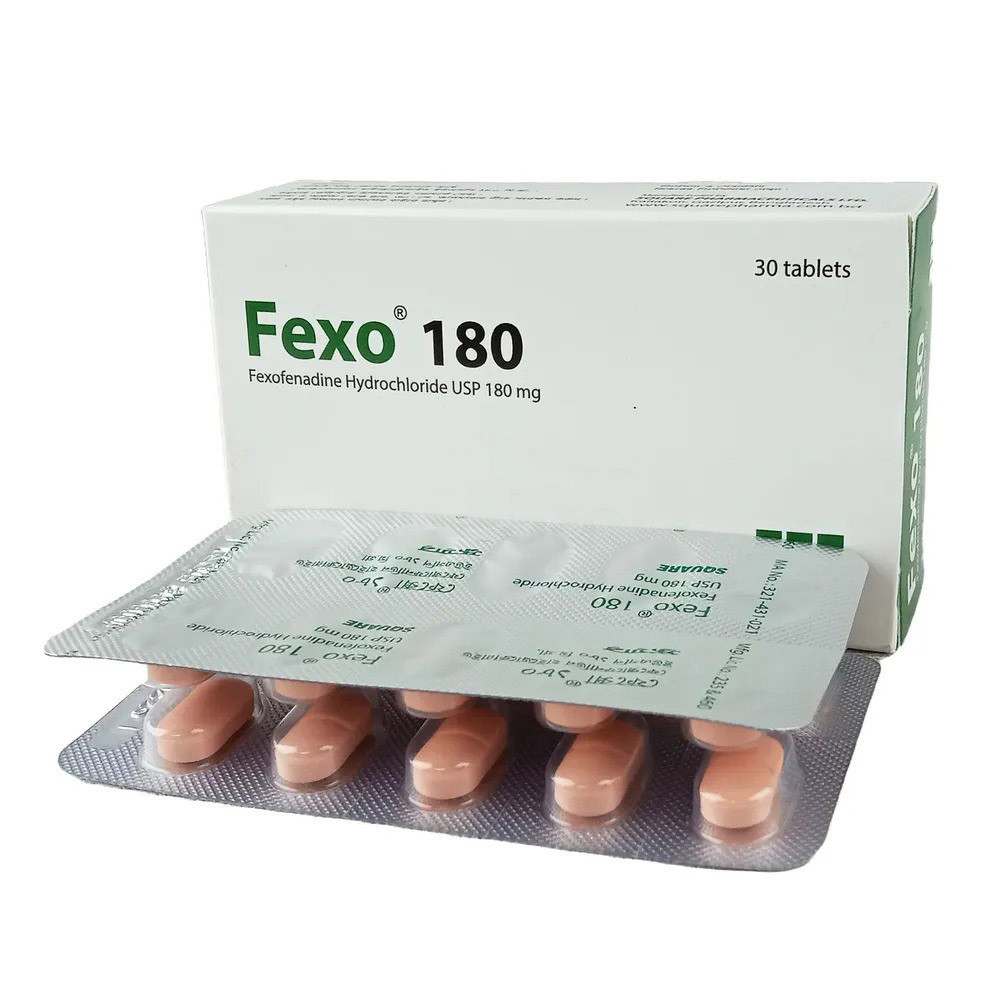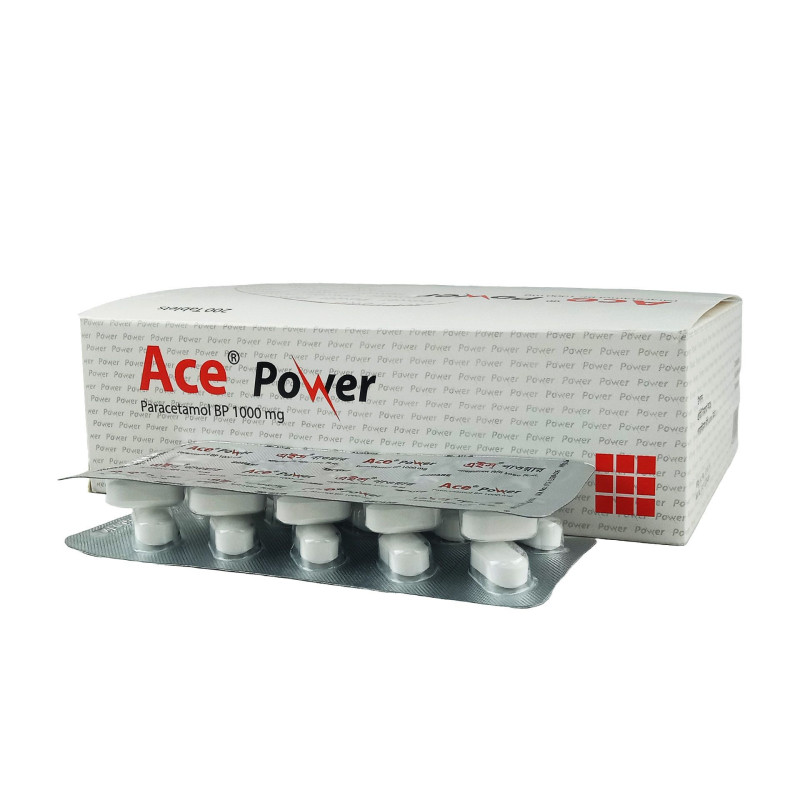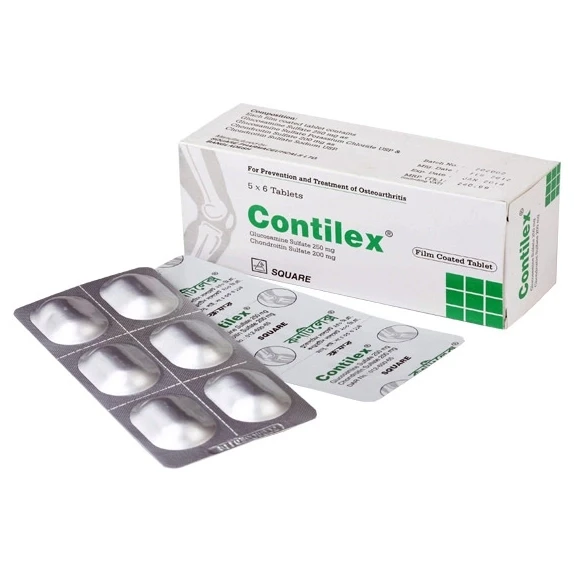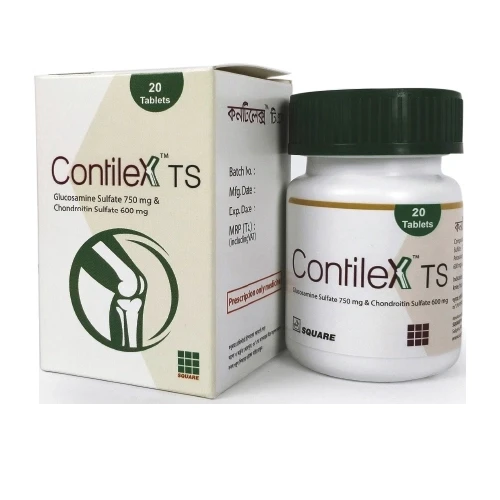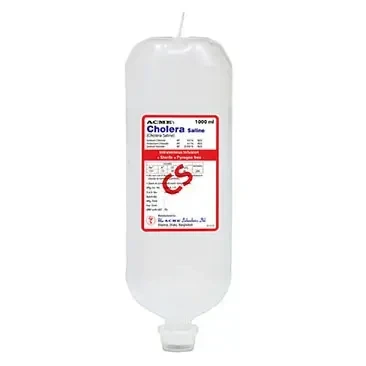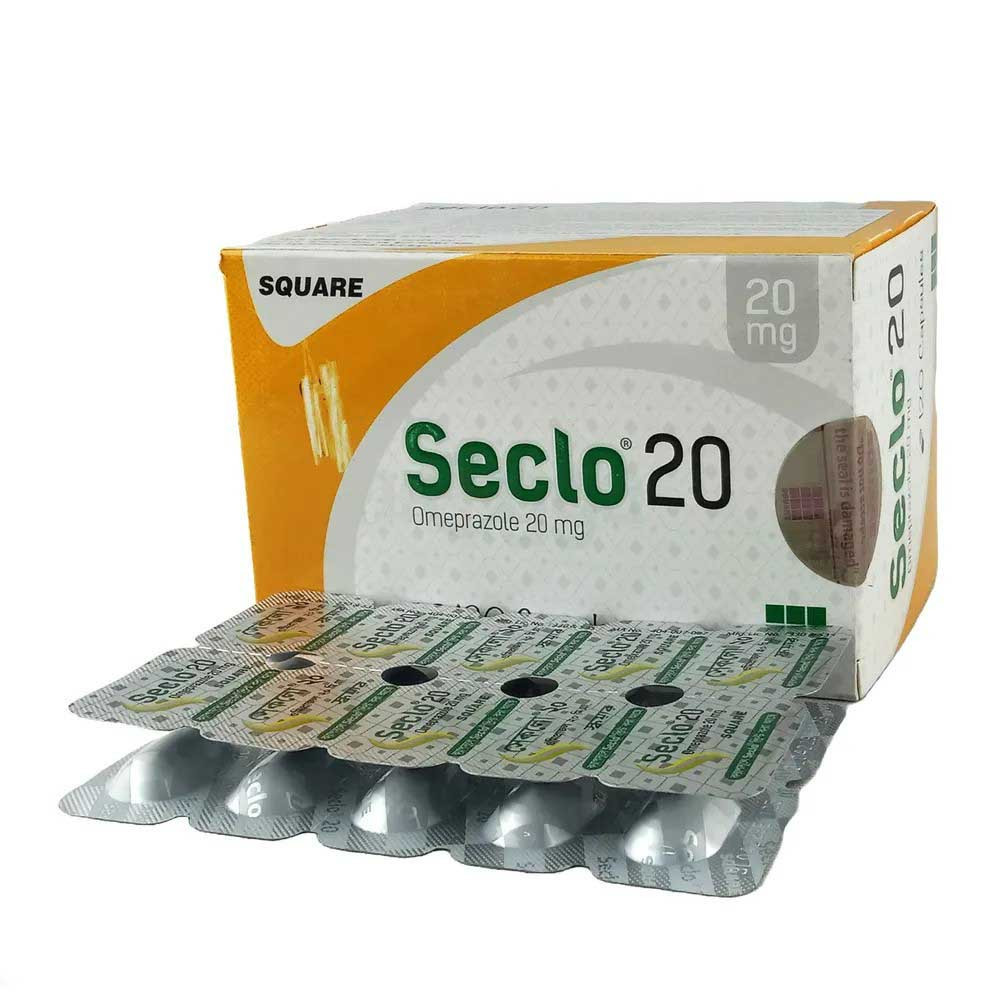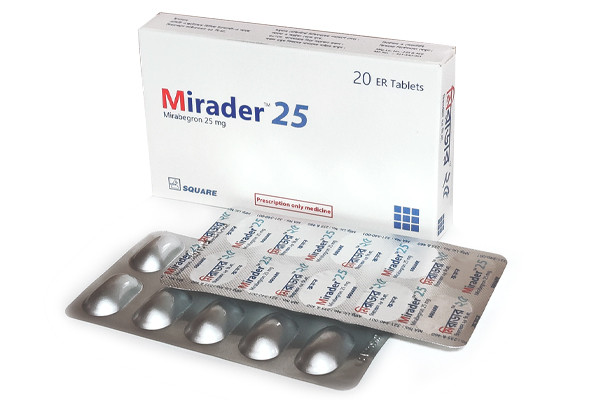

Mirader Tablet (Extended Release) Mirabegron 25 mg
Inhouse product
-
৳11.40
৳12.00 -
৳42.75
৳45.00 -
৳16.63
৳17.50 -
৳2.14
৳2.25
Reviews & Ratings
Indications
Mirader tablet is
indicated for the symptomatic treatment of urgency, increased micturition
frequency and urgency incontinence as may occur in adult patients with
overactive bladder (OAB) syndrome.
* রেজিস্টার্ড চিকিৎসকের পরামর্শ মোতাবেক ঔষধ সেবন করুন'
Pharmacology
Mirabegron is the
first beta-3 adrenoceptor agonist. Mirabegron exerts its effect via a dual
mechanism, both directly acts on the bladder smooth muscle and also via the
sensory nervous system, it increases the levels of cyclic adenosine
monophosphate (cyclic AMP) and leads to relaxation of the detrusor smooth
muscle during storage phase of urinary bladder fill-void cycle by activation of
beta-3 adrenoceptor which increase bladder capacity.
Dosage
Adults
including elderly: The recommended
starting dose is Mirabegron 25 mg tablet once daily with or without food. Based
on individual patient efficacy and tolerability the dose may be increased to
Mirabegron 50 mg tablet once daily.
Renal or hepatic
impairment:
- Patients with severe renal
impairment (ClCr 15 to 29 mL/min or eGFR 15 to 29 mL/min/1.73 m2) or
moderate hepatic impairment (Child-Pugh Class B), the daily dose of
Mirabegron should not exceed 25 mg tablet once daily.
- Mirabegron has not been studied
in patients with end stage renal disease (GFR <15 mL/min/1.73 m2 or
patients requiring haemodialysis) or severe hepatic impairment (Child Pugh
Class C) and it is therefore not recommended for use in these patient
populations.
Gender: No dose adjustment is necessary according to
gender.
Paediatric population: The safety and efficacy of Mirabegron in
children below 18 years of age have not yet been established.
* রেজিস্টার্ড চিকিৎসকের পরামর্শ মোতাবেক ঔষধ সেবন করুন'
Administration
Mirabegron tablet is
to be taken once daily, with liquids, swallowed whole and is not to be chewed,
divided, or crushed.
* রেজিস্টার্ড চিকিৎসকের পরামর্শ মোতাবেক ঔষধ সেবন করুন'
Interaction
Effect of enzyme
inhibitors: Mirader exposure
(AUC) was increased 1.8-fold in the presence of the strong inhibitor of
CYP3A/P-gp ketoconazole in healthy volunteers. No dose adjustment is needed
when Mirader is combined with inhibitors of CYP3A and/or P-gp. However, in
patients with mild to moderate renal impairment or mild hepatic impairment
concomitantly receiving strong CYP3A inhibitors, such as itraconazole,
ketoconazole, ritonavir and clarithromycin, the recommended dose is 25 mg once
daily with or without food. Mirader is not recommended in patients with severe
renal impairment or patients with moderate hepatic impairment concomitantly
receiving strong CYP3A inhibitors.
Effect of enzyme
inducers: Substances that are
inducers of CYP3A or P-gp decrease the plasma concentrations of Mirader. No
dose adjustment is needed for Mirader when administered with therapeutic doses
of rifampicin or other CYP3A or P-gp inducers.
Effect of Mirader on
CYP2D6 substrates: In healthy
volunteers, the inhibitory potency of Mirader towards CYP2D6 is moderate and
the CYP2D6 activity recovers within 15 days after discontinuation of Mirader.
Multiple once daily dosing of Mirader IR resulted in a 90% increase in Cmax and
a 229% increase in AUC of a single dose of metoprolol. Multiple once daily
dosing of Mirader resulted in a 79% increase in Cmax and a 241% increase in AUC
of a single dose of desipramine. Caution is advised if Mirader is
co-administered with medicinal products with a narrow therapeutic index and
significantly metabolised by CYP2D6, such as thioridazine, Type 1 C
antiarrhythmics (e.g., flecainide, propafenone) and tricyclic antidepressants
(e.g., imipramine, desipramine). Caution is also advised if Mirader is co-administered
with CYP2D6 substrates that are individually dose titrated.
Effect of Mirader on
transporters: Mirader is a weak
inhibitor of P-gp. Mirader increased Cmax and AUC by 29% and 27%, respectively,
of the P-gp substrate digoxin in healthy volunteers. For patients who are
initiating a combination of Mirader and digoxin, the lowest dose for digoxin
should be prescribed initially. Serum digoxin concentrations should be
monitored and used for titration of the digoxin dose to obtain the desired
clinical effect.
Other interactions: No clinically relevant interactions have
been observed when Mirader was co-administered with therapeutic doses of
solifenacin, tamsulosin, warfarin, metformin or a combined oral contraceptive
medicinal product containing ethinylestradiol and levonorgestrel.
Dose-adjustment is not recommended.
Contraindications
Mirabegron is
contraindicated in patients with hypersensitivity to the active substance or to
any of the excipients and severe uncontrolled hypertension defined as systolic blood
pressure 180 mm Hg and/or diastolic blood pressure 110 mm Hg.
Side Effects
The most common side
effects reported for patients treated with Mirader 50 mg during the three
12-week phase 3 double blind, placebo controlled studies are tachycardia and
urinary tract infections. The frequency of tachycardia was 1.2% in patients
receiving Mirader 50 mg. Tachycardia led to discontinuation in 0.1% patients
receiving Mirader 50 mg. The frequency of urinary tract infections was 2.9% in
patients receiving Mirader 50 mg. Urinary tract infections led to
discontinuation in none of the patients receiving Mirader 50 mg. Serious
adverse reactions included atrial fibrillation (0.2%).
Pregnancy & Lactation
There are limited
amount of data from the use of Mirabegron in pregnant women. Studies in animals
have shown reproductive toxicity. Mirabegron is not recommended during
pregnancy and in women is planning to be pregnant. Mirabegron is excreted in
the milk of rodents and therefore is predicted to be present in human milk. No
studies have been conducted to assess the impact of Mirabegron on milk
production in humans, its presence in human breast milk, or its effects on the
breast-fed child. Mirabegron should not be administered during breast-feeding.
There were no treatment-related effects of Mirabegron on fertility in animals.
The effect of Mirabegron on human fertility has not been established.
Precautions & Warnings
Renal impairment: Mirader has not been studied in patients
with end stage renal disease (GFR <15 mL/min/1.73 m2 or patients requiring
haemodialysis) and therefore, it is not recommended for use in this patient
population. Data are limited in patients with severe renal impairment (GFR 15
to 29 mL/min/1.73 m2); based on a pharmacokinetic study a dose reduction to 25
mg is recommended in this population. Mirader is not recommended for use in
patients with severe renal impairment (GFR 15 to 29 mL/min/1.73 m2)
concomitantly receiving strong CYP3A inhibitors.
Hepatic impairment: Mirader has not been studied in patients
with severe hepatic impairment (Child-Pugh Class C) and, therefore, it is not
recommended for use in this patient population. Mirader is not recommended for
use in patients with moderate hepatic impairment (Child-Pugh Class B)
concomitantly receiving strong CYP3A inhibitors.
Hypertension: Mirader can increase blood pressure. Blood
pressure should be measured at baseline and periodically during treatment with
Mirader, especially in hypertensive patients. Data are limited in patients with
stage 2 hypertension (systolic blood pressure 160 mm Hg or diastolic blood
pressure 100 mm Hg).
Patients with
congenital or acquired QT prolongation: Caution should be exercised when administering Mirader in
patients with congenital or acquired QT prolongation.
Patients with bladder
outlet obstruction and patients taking antimuscarinics medications for OAB: A controlled clinical safety study in
patients with bladder outlet obstruction (BOO) did not demonstrate increased
urinary retention in patients treated with Mirader; however, Mirader should be
administered with caution to patients with clinically significant bladder
outlet obstruction. Mirader should also be administered with caution to
patients taking antimuscarinic medications for the treatment of OAB.
Overdose Effects
Mirader has been
administered to healthy volunteers at single doses up to 400 mg. At this dose,
adverse events reported included palpitations and increased pulse rate
exceeding 100 beats per minute (bpm). Multiple doses of Mirader up to 300 mg
daily for 10 days showed increases in pulse rate and systolic blood pressure
when administered to healthy volunteers. Treatment for overdose should be
symptomatic and supportive. In the event of overdose, pulse rate, blood
pressure, and ECG monitoring is recommended.
Therapeutic Class
BPH/ Urinary
retention/ Urinary incontinence
Storage Conditions
Store in a cool and
dry place, protected from light.
Frequently Bought Products
Glysup Suppository 1ml, Glycerin 1 mg
Cholera Saline IV Infusion 1000 ml bag, Cholera Saline
Bet-A Cream 20 gm tube, Betamethasone Valerate 0.1%
Seclo Capsule (Enteric Coated), Omeprazole 20 mg
Entafi Capsule, Finasteride + Tadalafil 5 mg+5 mg
Product Queries (0)
Login Or Registerto submit your questions to seller
Other Questions
No none asked to seller yet
-
৳11.40
৳12.00 -
৳42.75
৳45.00 -
৳16.63
৳17.50 -
৳2.14
৳2.25
